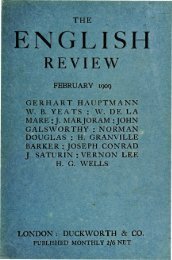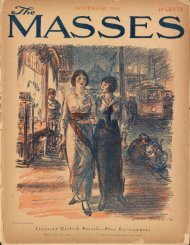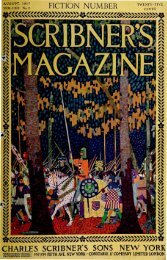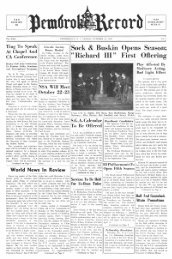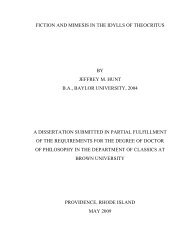20 Crushing the German Advance in American IndustryOrenstein - Arthur Actiengesellschaft, atBerlin. Similarly, the eighteen branchesof German insurance companies in thiscountry collected for their own use detailedplans and drawings of all the propertyinsured by them, with especial referenceto the hazard of the insured buildingsfrom fire, explosion, or other causes.Whether these interesting circumstanceshad any connection with the fact whichafterward became apparent, that whoeverwas planning the explosions which occurredin munition plants, seemed toknow the vulnerable points in which tocause the explosions, has been one of theunsolved riddles of the war.After the world war started, the Orenstein- Arthur Koppel Company took acontract to furnish certain railway suppliesto Russia, and the German agentswho were operating the plant became suddenlypossessed of the fear that in doingso they had violated the penal code of theFatherland in agreeing to furnish suppliesto an enemy of Germany. Inquiry bythem at the German Embassy in Washingtondeveloped the fact that it was aviolation, but the German agents at Koppelexpressed the hope that this violationof the German law might well be condonedin view of the fact that they were inposition to render a great service to theFatherland by taking the contract withRussia and failing to deliver the goods.This was fighting the war in Pennsylvaniain the days when we were trying in goodfaith to be neutral.The Bosch Magneto Company, by secretownership of the stock of competitors,had reached a point where it controlledmore than half of the business in thiscountry in magnetos and battery ignitionsystems. It secretly owned the majorpart of another magneto company, andthrough stock ownership controlled thelargest producer of moulded insulation, aproduct which was essential to the magnetoindustry. It had acquired for abouta million dollars another competitor,whose plant was promptly shut down anddismantled. In addition to these investments,the Bosch Magneto Companyowned and operated a well-equipped factoryat Springfield, Massachusetts, withbranches at Detroit, Chicago, and SanFrancisco, and, when the war opened, itsproducts had obtained first place in theminds of the American purchasing public.It was ostensibly American-owned.It had only twenty-five thousand dollarsof capital stock, though it was afterwardsold to American purchasers for four millionone hundred and fifty thousand dollars,and of this stock all but a few sharesstood in the name of American citizens,who at first steadfastly insisted that therewas no enemy interest in the company.Despite this alleged American ownershipduring the period of our neutrality, thecompany was openly pro-German in itssympathies and activities. Though itmanufactured a product highly importantin war, it refused to sell anything to eitherthe allied governments or to any purchaserssuspected of being interested forthe allied governments. It did this underan alleged impartial business policyof refusing to supply materials for anybelligerent, but it was, of course, playingGermany's game. When the UnitedStates went into the war the companystill held back, and it was not until aftera most searching investigation, followedby a confession by the men who had concealedthe enemy ownership, that theAlien Property Custodian was able totake over the business. When he didtake it over, he made the Government ofthe United States its preferred customer,and at the time of the armistice was furnishingeighty-five per cent of the productof the Bosch Magneto Company to thisgovernment for war purposes.The Bosch Magneto Company presentsan interesting example of the Germanmethod of invading our market.Bosch had taken out a large number ofAmerican patents. The Bosch MagnetoCompany was permitted to use these patents,but when that company was takenover as enemy property, it was learnedthat it had no title whatever to the patents,either by assignment, license, orotherwise. Bosch had simply been permittinghis own company to use themwithout paying royalty or license fee, relyingfor his compensation upon theenormous profits which the companycould earn in the manufacture of theproduct for his benefit. It was this circumstancethat first carried convictionto the minds of our investigators that the
Crushing the German Advance in American Industry 21American owners of the stock were, infact, dummies.Down in the Virgin Islands is the beautifulharbor of St. Thomas. At the mostadvantageous point in that harbor, theHamburg-American line built a greatterminal, consisting of land, buildings,docks, warehouses, water-tanks, and cisterns,lighters, motor - boats, loadingparaphernalia, and coaling facilities.This plant had all the characteristics ofa naval base; it is significant that itsprincipal building commanding the harboris of reinforced concrete, the plaza infront of it having an eight-foot foundationof concrete fit for gun emplacements.When we contemplate the fact that bythis convenient arrangement a ship of theHamburg-American line, a corporationsubsidized by the German Empire, andin which the Kaiser was a stockholder, atany moment might have unloaded longrangeguns from its hold, and promptlyput them in position to command theentrance to the Caribbean Sea, we mayhave some substantial clue to the reasonwhich prompted Germany in bringingsufficient influence to bear upon Denmarkto prevent the sale, whenever Americain the last twenty-five years sought toacquire the Danish West Indies.St. Thomas lies forty miles east ofPorto Rico in the very track of vesselssailing to and from Europe, Central andSouth America, the West Indies, PanamaCanal, and the Gulf and Atlantic coastStates. Its splendid harbor enjoys marvellousnatural protection, and can beeasily fortified. Germany clung to thisproperty with amazing tenacity. Whenwe came to investigate its ownership, wefound the title to be apparently in aDanish lawyer of St. Thomas, one Jorgenseh,who claimed that on January 22,1917, five days after the United Stateshad purchased the Islands from Denmark,he himself had purchased the propertyfrom the business agent of the Hamburg-American line, who was also the GermanConsul at St. Thomas. The sole considerationin this pretended sale was Jorgensen'snote for two hundred and tenthousand dollars, which he gave his client;—the Hamburg-American line—payablein three months without interest, andwith the provision that it should be renewedevery three months until after thewar. Jorgensen had the deed for theproperty, as well as his note, while theGerman Consul had a copy of the noteand was continuing in charge. The AlienProperty Custodian took both note anddeed, and Jorgensen finally executed adeed quitclaiming his title to the AlienProperty Custodian, by whom the propertywas sold for the same amount of twohundred and ten thousand dollars to theGovernment of the United States, and itwill now become an American naval base.The time will doubtless come when theHamburg-American line will protest thatthe Custodian sold the property to thegovernment for too low a price, but thecircumstances are such that, caught intheir own trap, they will have to admitthat the price was fixed by their ownagents.Another interesting case is that of theGerman-American Lumber Company,whose valuable property is located on theshores of St. Andrew's Bay on the westcoast of Florida. It is interesting to observethat St. Andrew's Bay is said to bethe finest harbor on the Gulf of Mexico,and the nearest harbor in America to thePanama Canal. Here a typical Junker,a prince of the German Empire, ForstlichSchamburg Holfkammen, had made alarge investment running into millions.He seems never to have visited the property,nor received any dividends or otherearnings from it, but allowed the profitsto be returned to the business, and furtherinvestments made until the company hadacquired more than a hundred thousandacres of timber lands near the bay. TheGerman Consul at Pensacola was the secretaryof the company, while its chiefofficer changed about every two years; ineach case, however, being a man who wassent there by Germany from a similarenterprise in South America. Vigorousopposition was offered by the companyto an American railroad which sought topenetrate its lands to the water's edge.Its lands were so situated that, if theAmerican Government itself had desiredto build terminal facilities for its own useupon its own harbor, to open quick anddirect communication with the PanamaCanal, it would have had to deal with theGerman Empire. When we took over
- Page 1 and 2:
JULYMR. SCHWAB'S VIEWS ONGOVERNMENT
- Page 3 and 4:
SCRIBNER'SMAGAZINEPUBLISHED MONTHLY
- Page 5 and 6:
CONTENTSSCRIBNER'SMAGAZINEVOLUME LX
- Page 7 and 8:
CONTENTSvPAGEFOR BETTER ILLUSTRATIO
- Page 9 and 10:
CONTENTSviiREMAKING OF FRANCE, THE
- Page 11 and 12:
Vol. LXVI. No. 1 J U L Y 1919SCRIBN
- Page 13 and 14:
Dance any time —the Victrola is a
- Page 15 and 16:
Xeg. U. S.Patent Otf.SCRIBNER'SFift
- Page 17 and 18:
Reg. U. S.Patent Ujff.SCRIBNER'SFif
- Page 19 and 20:
Reg. V. S.Patent Off.SCRIBNERSFifth
- Page 21 and 22: nReg. U. S.Patent OJf.SCRIBNER'SFif
- Page 23 and 24: SendtheSamplerand wina smile !$1-25
- Page 25 and 26: BOOKNOTESConference of Czecho-Slova
- Page 27 and 28: " Wells at his best — exciting an
- Page 29 and 30: The two outstanding literaryevents
- Page 31 and 32: The Book of the National P a r k sB
- Page 33 and 34: — there are booKs here that bvill
- Page 35 and 36: SIMSU.S.N.iT WAS SIMS who, under th
- Page 37 and 38: Roosevelt said-"Nn oilier man in th
- Page 39 and 40: (Reduced Illustration jrom The Hous
- Page 41 and 42: New York StateM O H E G A Nl—Mohe
- Page 43 and 44: Private SchoolsMassachusettsSea Pin
- Page 45 and 46: PEDDIENew Jerseya school that educa
- Page 47 and 48: TennesseeThe Oldest SchoolFor Girls
- Page 49 and 50: Camps—Summer Schools Corresponden
- Page 52 and 53: Drawn by Alonzo Kimball."ARRAH, DHR
- Page 54 and 55: 2 In Moroccoless carts, omnibuses a
- Page 56 and 57: 4 In Moroccorush-roofed huts in a b
- Page 58 and 59: 6 In MoroccoSpaniards are serving t
- Page 60 and 61: From a photograph from the Service
- Page 62 and 63: 10 In Moroccomade grave, there are
- Page 64 and 65: 12 In Moroccoministers it, the Euro
- Page 66 and 67: 14 In MoroccoThis lovely ruin is in
- Page 68 and 69: 16 In Moroccolike a desert travelle
- Page 70 and 71: I8Crushing the German Advance in Am
- Page 74 and 75: 22 Crushing the German Advance in A
- Page 76 and 77: 24 Crushing the German Advance in A
- Page 78 and 79: 26Dead Men's Shoesa splendid little
- Page 80 and 81: 28 Dead Men's Shoesthat, and I neve
- Page 82 and 83: 30 Dead Men's Shoesgratifying, sinc
- Page 84 and 85: 32 Dead Men's Shoescasting him off
- Page 86 and 87: 34 Dead Men's Shoes"I think I may a
- Page 88 and 89: 36 Dead Men's Shoesbecame more pron
- Page 90 and 91: 38 The Arctic Hospitalimportant tri
- Page 92 and 93: The water-wagon, St. Stephen's Hosp
- Page 94 and 95: Christmas in the Children's Ward, S
- Page 96 and 97: 44 The Arctic Hospitalwoodlands and
- Page 98 and 99: The enemy artillery-fire did damage
- Page 100 and 101: Drawn by Frank Tenney Johnson."And
- Page 102 and 103: 50The Hunting of Bud Howlandwood, t
- Page 104 and 105: 52 The Hunting of Bud HowlandWanted
- Page 106 and 107: 54 Mr. Boylecitement as I saw more
- Page 108 and 109: 56 Mr. Boyle" 'Tis foine names yez
- Page 110 and 111: 58 Mr. BoyleShe did, and he told th
- Page 112 and 113: 60 Mr. BoyleThoughtfully, half an h
- Page 114 and 115: 62 Mr. Boyleset you on the trail so
- Page 116 and 117: 64 Mr. Boyle"'Tis not all," went on
- Page 118 and 119: 66 Mr. Boylenot worth while to stan
- Page 120 and 121: Village near Aleppo with conical hu
- Page 122 and 123:
70 The Berlin to Bagdad Linethe gol
- Page 124 and 125:
72 The Berlin to Bagdad Linethe Bag
- Page 126 and 127:
Turkish peasant with his boy and gi
- Page 128 and 129:
Looking across the Euphrates.night'
- Page 130 and 131:
78 The Making of William Simmsstruc
- Page 132 and 133:
'Every Saturday night I waited for
- Page 134 and 135:
82 The Making of William Simmsfor i
- Page 136 and 137:
84 The Making of William Simmslooki
- Page 138 and 139:
86 A Theatrical Boarding-House in S
- Page 140 and 141:
88 A Theatrical Boarding-House in S
- Page 142 and 143:
90 A Theatrical Boarding-House in S
- Page 144 and 145:
92 A Theatrical Boarding-House in S
- Page 146 and 147:
94 A Theatrical Boarding-House in S
- Page 148 and 149:
96 A Theatrical Boarding-House in S
- Page 150 and 151:
98 The Vestment Makertions. I won't
- Page 152 and 153:
100 Government Ownership and Indivi
- Page 154 and 155:
FOURDOG PICTURESBy George Ford Morr
- Page 156 and 157:
Copyright by George FordMorris.The
- Page 158 and 159:
SWORDFISHINGBy Horace Winston Stoke
- Page 160 and 161:
108 Swordfishingthe best, would hav
- Page 162 and 163:
110 Swordfishing"Want to come along
- Page 164 and 165:
The pulpit, by the way, is the plac
- Page 166 and 167:
114 Conquestfeet of motion for ever
- Page 168 and 169:
116 A Recruit for Law and OrderOf h
- Page 170 and 171:
118 A Recruit for Law and Orderafra
- Page 172 and 173:
120 A Recruit for Law and Orderone
- Page 174 and 175:
122 The Point of Viewof a broken bu
- Page 176 and 177:
124 The Point of Viewleisure for th
- Page 178 and 179:
126 The Field of Artcover only the
- Page 180 and 181:
128 The Field of Artdisaster, the n
- Page 182 and 183:
130 The Financial Situationthe remo
- Page 184 and 185:
132 Some Thoughts on Resumption of
- Page 186 and 187:
Big Work Fora Big" StoreThe deliver
- Page 188 and 189:
BEEMAN'ScHEWING GUMORIGINALPEPSINIr
- Page 190 and 191:
LASTLONGFEATHERWEIGHTFLAT-KNITUnion
- Page 192 and 193:
More AmericanReserve PowerREMINGTON
- Page 194 and 195:
Take a nice, clean cup. Put half a
- Page 196 and 197:
D U R A N DSTEEL RACKSEquipyourbath
- Page 198 and 199:
Refreshing DraughtsGENERAL ELECTRJC
- Page 200 and 201:
Get a Pyrene onyour own cariT was l
- Page 202 and 203:
THEFINANCIAL SITUATIONContinued fro
- Page 204 and 205:
Financial Situation, continued from
- Page 206 and 207:
Financial Situation, continued from
- Page 208 and 209:
Financial Situation, continued from
- Page 210 and 211:
A Typical MunicipalBond OfferingTo
- Page 212 and 213:
Monthly Dividendsand MonthlyEarning
- Page 214 and 215:
Investingto theBest AdvantageDiscri
- Page 216 and 217:
Investments PlusConservative old Ne
- Page 218 and 219:
A Unique ExperienceBetween 1909 and
- Page 220 and 221:
Investment DiversificationTo practi
- Page 222 and 223:
M I L L E RS E R V I C EFor Investo
- Page 224 and 225:
Lackner, Butz & CompanyIntroduction
- Page 226 and 227:
SelectedInvestmentSecuritiesWe own
- Page 228 and 229:
OVERSEAS TRADEContinued from page 1
- Page 230 and 231:
86 Some Thoughts on Resumption of T
- Page 232 and 233:
88 Some Thoughts on Resumption of T
- Page 234 and 235:
A REGULARHOLD UPA few ounces of KAP
- Page 236 and 237:
There is danger intender gumsThe"Un
- Page 238 and 239:
OF the many common-sense featuresab
- Page 240 and 241:
GenuineBayer-Tabletsof AspirinAn un
- Page 242 and 243:
THE HOLLEY HOTELOn Beautiful Washin
- Page 244 and 245:
VisitYour National PlaygroundsOut W
- Page 246 and 247:
prest-o-litebattery"Will She Be Lat
- Page 248 and 249:
The Cord Tire is the tire for carsd
- Page 250 and 251:
PHOTOGRAPHS OF MOON CARS ARE NOT RE
- Page 252 and 253:
A M H OMeans Better Underwearqualit
- Page 254 and 255:
The Invalid in Your Home" We are de
- Page 256 and 257:
With the whole-hearted resourcefuln
- Page 258 and 259:
An Error!A comfortable five-passeng
- Page 260 and 261:
KEePSMILINGWITHKELLYS
- Page 262 and 263:
Garden HoseFACTSAboutWHAT constitut
- Page 264 and 265:
Vacation Landsare made more delight
- Page 266 and 267:
fIRE drills are good,but not infall
- Page 268 and 269:
It seems natural to trust to Ivory
- Page 270:
Go where youwill, you'llfind no bet



